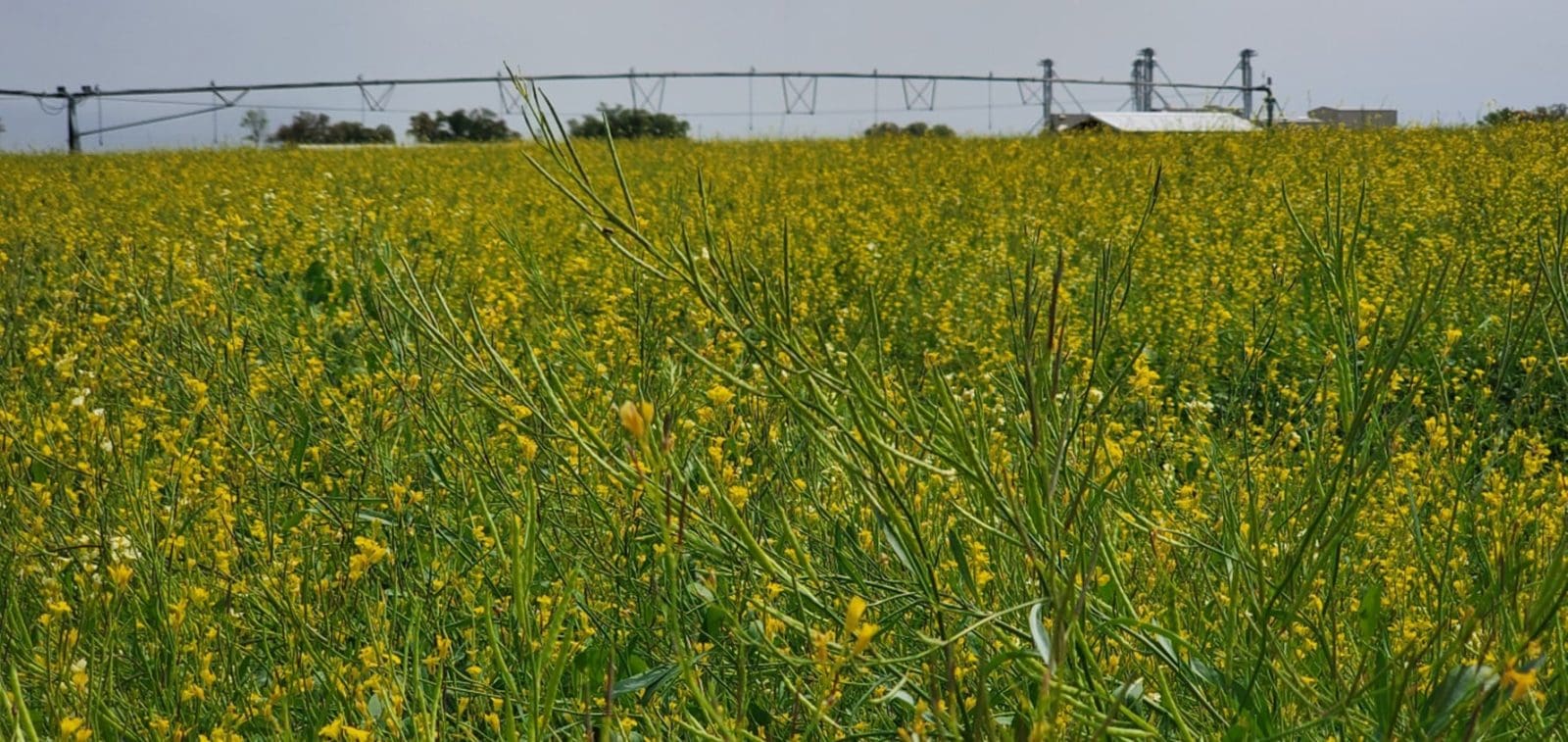
Carinata is expanding in parts of the United States. Photo: Nuseed
AUSTRALIA’S cotton-growing regions are being targeted for trials to grow the non-edible renewable fuel feedstock crop, carinata.
Nuseed, the seed division of Australian agricultural chemical company Nufarm, is eyeing trials of carinata this year, according to general manager Rachel Palumbo.
Carinata is touted as a carbon-neutral drop-in substitute for fossil fuels that does not require retrofitting of aircraft, machinery or vehicles.
The crush process also produces a high-protein meal which is considered suitable in feed rations for ruminant animals, pigs and poultry.
Ms Palumbo told the ABARES Outlook event held at Canberra earlier this month that the oilseed crop would have agronomic and economic benefits for growers.
“Our commercial trials this year will be in cotton as a break crop for growers so it’s not displacing their primary source of income,” Ms Palumbo said.
“The idea is that it would provide them with both economic as well as soil-health benefits potentially.”

Nuseed general manager Rachel Palumbo
She said the company was working to ensure the varieties were “shorter season, have disease resistance, have herbicide tolerance” to be able to “fast-track” the success of the new industry.
New value-add industry
Ms Palumbo said bringing carinata to Australia’s cropping systems could create a new industry which could drive growth for farmers, agribusinesses and other aligned sectors.
“The development of a local renewable-fuels industry will really drive the scaling of feedstock production that will ultimately strengthen farmers’ sustainability, and productivity.
“We are focused on how this contributes to grower profitability and resilience, ultimately.”
She said Nuseed was continuing to improve the “value proposition” for growers to ensure widespread adoption in the future as well as to “help growers diversify their incomes and deliver productivity and sustainability benefits”.
Net-zero crop
In addition to abating carbon emissions from aviation and transport industries, Ms Palumbo said, like other crops, carinata also sequestered carbon in soils.
“We see opportunities to unlock new pathways for ag decarbonisation, and part of that is around the production of crop-based feedstocks for renewable fuels.
“We believe that crop-based feedstocks can help Australian farmers lower their carbon emissions and help decarbonise hard-to-abate sectors such as aviation.
“Carinata removes atmospheric carbon as it grows.
“Carbon that is released upon combustion of end-use fuels is equivalent to that captured throughout the growth cycle.
“This harvested feedstock is considered to be a carbon-neutral renewable source of energy.”
Canola versus carinata
Currently, canola is a key crop for biofuel production, with Australia exporting over 1.8 million tonnes annually to the European Union to be used as a fuel source.
In recent years, the use of canola for biofuel has drawn some criticism, with a renewed focus to prioritise cropping land for food production over fuel.
The most prominent critics included two German Government ministers who, in early 2023, flagged legislation to phase out the use of food crops as biofuel by 2030.
Ms Palumbo said Nuseed doesn’t intend for carinata to replace canola in a crop rotation.
“We’ve been able to find a fit in the agricultural system that doesn’t displace a food crop, so we are not looking at putting carinata today where we grow canola,” Ms Palumbo said.
“We are looking at fitting it in a different place in the farming system.”
Canola has only a handful of growers in Qld, and while NSW is a major grower of canola for domestic use and export, very little comes from the state’s major cotton-growing areas on the plains of north-west, central, and south-west NSW.

The first shipment of carinata loads in Argentine en route to oilseed crusher Saipol in France in January 2023. Photo: Nuseed
Overseas success
Nuseed’s carinata saw its first commercial planting in 2022 in Argentina and Uruguay as an oilseed cover crop.
Also in 2022, Nuseed and BP signed a 10-year offtake and market-development agreement to process the crop to use or sell as a sustainable biofuel.
As part of this agreement, the first shipment of carinata left Argentina for France in January 2023.
The shipment was processed by oilseed crusher, Saipol, before being delivered to BP.
The crop has since expanded to southern states in the United States, with Nuseed hoping to undertake first commercial plantings in Spain and France this year.
Further backing the crop, Association of Argentine Cooperatives has reportedly said that it has a goal to plant one million hectares of carinata.
Early trials promising
There has also been some early work undertaken to show the potential of carinata in Australian farming systems.
Before Nuseed began contracting growers to produce carinata on a commercial scale, University of Queensland scientists, together with Agrisoma BioSciences, a Canadian company purchased by Nuseed in 2019, completed trials in 2017 and 2018.
Conducted across 20 field trial sites in Qld, NSW, Victoria, South Australia, and Western Australia, the project demonstrated that carinata would thrive in the Australian climate and, in some regions, have yields like canola varieties.
Processing questions
It is unclear how and where any Australian-grown carinata would be crushed into oil suitable for biofuel.
BP previously operated two crude-oil refineries at Kwinana in Perth, which closed in 2021, and Bulwer Island in Brisbane which was decommissioned in 2015.
Both sites are primarily being used as fuel import facilities.
However, BP, alongside industry partners, is exploring biofuel and green hydrogen production at the facilities, with a demonstration project completed at Bulwer Island last year and an energy hub to be developed at the Kwinana site.
BP has signalled plans to repurpose the existing refining infrastructure at Kwinana to produce biofuels from feedstocks by 2026.
Although closer to cotton-growing regions, reports indicate refining infrastructure was removed from the Bulwer Island site.
BP could also continue its existing arrangement with Saipol and export the carinata for value-adding in France.
Grain Central: Get our free news straight to your inbox – Click here

Is anyone looking at getting the growers fuel self-sufficient?
Not that we know of. Maybe something we’ll see in the future. Regards, Liz